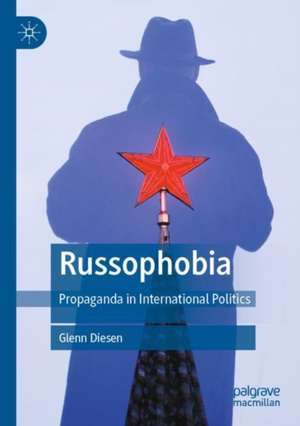Russophobia: Propaganda in International Politics
Autor Glenn Diesenen Limba Engleză Paperback – 23 apr 2023
| Toate formatele și edițiile | Preț | Express |
|---|---|---|
| Paperback (1) | 714.44 lei 6-8 săpt. | |
| Springer Nature Singapore – 23 apr 2023 | 714.44 lei 6-8 săpt. | |
| Hardback (1) | 718.16 lei 6-8 săpt. | |
| Springer Nature Singapore – 23 apr 2022 | 718.16 lei 6-8 săpt. |
Preț: 714.44 lei
Preț vechi: 871.27 lei
-18% Nou
Puncte Express: 1072
Preț estimativ în valută:
136.77€ • 140.66$ • 113.47£
136.77€ • 140.66$ • 113.47£
Carte tipărită la comandă
Livrare economică 15 februarie-01 martie
Preluare comenzi: 021 569.72.76
Specificații
ISBN-13: 9789811914706
ISBN-10: 9811914702
Pagini: 307
Ilustrații: VIII, 307 p. 1 illus.
Dimensiuni: 148 x 210 mm
Greutate: 0.42 kg
Ediția:1st ed. 2022
Editura: Springer Nature Singapore
Colecția Palgrave Macmillan
Locul publicării:Singapore, Singapore
ISBN-10: 9811914702
Pagini: 307
Ilustrații: VIII, 307 p. 1 illus.
Dimensiuni: 148 x 210 mm
Greutate: 0.42 kg
Ediția:1st ed. 2022
Editura: Springer Nature Singapore
Colecția Palgrave Macmillan
Locul publicării:Singapore, Singapore
Cuprins
Chapter 1. Theorising propaganda.- Chapter 2. Stereotypes of anti-Russian propaganda. - Chapter 3. Source credibility: Herding the masses.- Chapter 4. Language and narratives in anti-Russian propaganda.- Chapter 5. Selling democracy: All nations are equal, but some are more equal than others.- Chapter 6. Russophobia against the political opposition.- Chapter 7. The conflict in Ukraine as a civilizational choice.- Chapter 8. The Syrian war and humanitarian interventionism.- Chapter 9. Propaganda and the risks from irrationality.
Notă biografică
Glenn Diesen is a professor in political economy and sociology at the University of South-Eastern Norway and an editor at the Russia in Global Affairs journal. He has published eight books about Russian foreign policy, conservatism, and political economy.
Textul de pe ultima copertă
“This courageous piece of work proposes a deep and comprehensive approach of an upmost problem of contemporary international politics at a pivotal moment of our history. An indispensable book for understanding the present state of the world.”
– Guy Mettan, journalist and author of Creating Russophobia
“These days one needs a lot of intellectual and even personal courage to address the notion of Russophobia, which has become so common in the ongoing information war between Russia and the West. To Professor Diesen’s credit, his book presents an academically rigorous and well documented attempt to analyze the origins, evolution and modern manifestations of this complex phenomenon.”– Andrey Kortunov, Director General of the Russian International Affairs Council “Glenn Diesen continues the tradition of studying Western presentations of Russia as the inferior and aggressive Other. He sheds important light on 'Us' versus 'Them' strategies exploited by Western political and media circles in cases of RussiaGate, Ukraine, and Syria.”
– Andrei P. Tsygankov, San Francisco State University
“An incisive takedown of the neo-McCarthyite chauvinism that has consumed Western political culture, to the great detriment of honest journalism and global peace.”
– Aaron Maté, journalist at the Grayzone and former producer of Democracy Now
Propaganda is the science of convincing an audience without appealing to reason. Over the past centuries, anti-Russian propaganda has been founded on juxtaposing the West and Russia as European versus Asiatic, civilized versus barbaric, modern versus backward, liberal versus autocratic, and even good versus evil. Russia has therefore throughout history been allowed to play one of two roles―either an apprentice of Western civilization by accepting the subordinate role as the student and political object, or a threat that must be contained or defeated. While propaganda has the positive effect of promoting unity and mobilizing resources against an adversary, it has the negative effect of creating irrational decision-making and obstructing a workable peace.
Glenn Diesen is a Professor at the University of South-Eastern-Norway.
– Guy Mettan, journalist and author of Creating Russophobia
“These days one needs a lot of intellectual and even personal courage to address the notion of Russophobia, which has become so common in the ongoing information war between Russia and the West. To Professor Diesen’s credit, his book presents an academically rigorous and well documented attempt to analyze the origins, evolution and modern manifestations of this complex phenomenon.”– Andrey Kortunov, Director General of the Russian International Affairs Council “Glenn Diesen continues the tradition of studying Western presentations of Russia as the inferior and aggressive Other. He sheds important light on 'Us' versus 'Them' strategies exploited by Western political and media circles in cases of RussiaGate, Ukraine, and Syria.”
– Andrei P. Tsygankov, San Francisco State University
“An incisive takedown of the neo-McCarthyite chauvinism that has consumed Western political culture, to the great detriment of honest journalism and global peace.”
– Aaron Maté, journalist at the Grayzone and former producer of Democracy Now
Propaganda is the science of convincing an audience without appealing to reason. Over the past centuries, anti-Russian propaganda has been founded on juxtaposing the West and Russia as European versus Asiatic, civilized versus barbaric, modern versus backward, liberal versus autocratic, and even good versus evil. Russia has therefore throughout history been allowed to play one of two roles―either an apprentice of Western civilization by accepting the subordinate role as the student and political object, or a threat that must be contained or defeated. While propaganda has the positive effect of promoting unity and mobilizing resources against an adversary, it has the negative effect of creating irrational decision-making and obstructing a workable peace.
Glenn Diesen is a Professor at the University of South-Eastern-Norway.
Caracteristici
Societal relevance of how Russiagate was accepted uncritically The benefits and costs of propaganda Exploring the concept of propaganda
